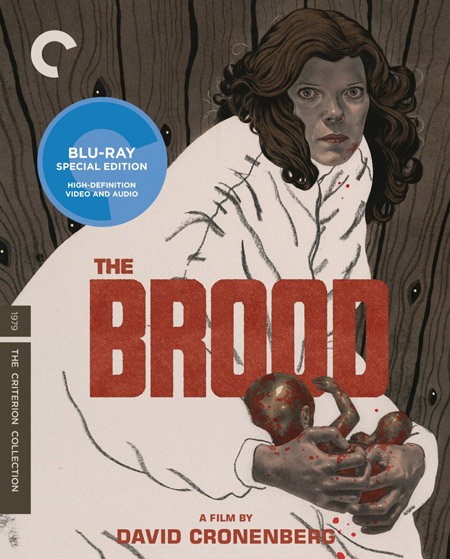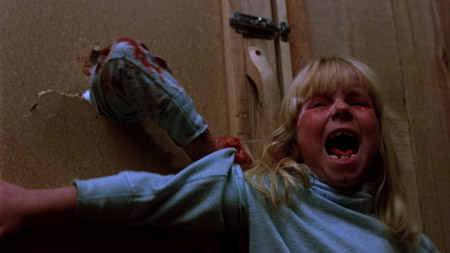
“MOMMIE’S DEARESTâ€
By Raymond Benson
David
Cronenberg’s horror films always seem to tackle subjects that involve an
unpredictable human body and the terror of your consciousness residing inside
of it. He explored parasites in his first mainstream picture, Shivers (aka They Came From Within, 1975), and viral “stingers†than grow in a
woman’s armpit in his second, Rabid,
1977. The rest of his movies, leading up to the ultimate statement of being
trapped in a horrible body, The Fly
(1986), all dealt with some aspect of physical or mental transformation. The Brood, released in 1979, fits right
in with Cronenberg’s thematic fascination with flesh and blood. And it’s a
corker.
Oliver
Reed plays Dr. Raglan, an unorthodox psychotherapist who uses controversial
techniques that cause his patients to manifest their inner turmoil and anger
into visible, bizarre growths on their bodies. One guy sprouts spots. Another
man grows a weird gland on the outside of his neck. The most extreme result of
Dr. Raglan’s methods occurs with a disturbed woman named Nola (Samantha Eggar),
who was abused as a child and is in the throes of a divorce and custody battle
with her husband Frank (Art Hindle). Nola is growing “wombs†on her body that eventually
give birth to horrific dwarf “copies†of her and Frank’s five-year-old daughter
Candice (Cindy Hinds)—except these siblings are murderous creatures unwittingly
and psychically controlled by their mother. They have the faces of trolls, no
navels, and are anatomically asexual, but otherwise they are somewhat identical
to Candice. (Where they get the clothes that Candice wears is unexplained.)
As
a horror film, The Brood brilliantly
succeeds. The shocks are genuine, the gross-out factor is palpable, and the
story—which is absurd on the surface—is intelligently well-written (by
Cronenberg himself). Apparently the impetus for the film was the director’s
harrowing experience in going through a divorce and rescuing his child from a
cult.
Reed
delivers one of his best campy performances, and Eggar is suitably deranged in
her part. Of particular note is young Hinds, who manages to be simultaneously
innocent and creepy—this was her first acting role. Perhaps the weakest link in
the picture is Hindle, who somehow never reaches the emotional heights that his
co-stars do.

It’s
a fairly low-budget affair, made for a little less than two million dollars,
but the visual effects and production values are top-notch. As noted in the new
supplemental documentary on the film’s making, all the strange bodily terrors
were accomplished with clever makeup applications—in particular, the use of
various-sized condoms filled with movie blood and... other stuff. Eggar relates
how hilarious this actually was on the set; she could hardly keep from laughing
as the crew glued the ends of prophylactics onto her torso.
Criterion
has released a new, restored 2K digital transfer, supervised by Cronenberg,
with an uncompressed monaural soundtrack. As is usually the case with Criterion
Blu-rays, the video is gorgeous and vividly colorful—and this is one of those
movies in which the color is practically a character in the film! Supplements
include: the new documentary featuring interviews with Eggar, executive
producer Pierre David, cinematographer Mark Irwin, assistant director John
Board, and special makeup effects artists Rick Baker and Joe Blasco (neither of
whom worked on The Brood, but served
on other Cronenberg pictures); a 2011 interview with Cronenberg covers his
early career in the 70s; a 2013 interview with Hindle and a grown-up Hinds is
conducted by the editor of Fangoria magazine;
and—most fun of all—a segment from The
Merv Griffin Show from 1980, featuring Reed verbally sparring with Orson
Welles. There’s also a radio spot and an essay by critic Carrie Rickey in the
booklet.
Another
notable supplement is Cronenberg’s rare second feature film, Crimes of the Future (1970), made in
color on a shoestring budget. This is a truly bizarre picture about a world in
which all the women capable of reproducing are gone (killed by toxic cosmetics)
and men are attempting to compensate without a feminine influence in their
lives. A little too stilted for its own good, Crimes serves as a curiosity in the Cronenberg pantheon that is
worth seeing... once.
But
the main attraction is an excellent fright fest. The Brood has arrived in glorious high definition just in time for
Halloween. Grab the popcorn, turn out the lights, and prepare yourself for some
truly nightmarish material. The Brood is
a keeper.
CLICK HERE TO ORDER FROM AMAZON